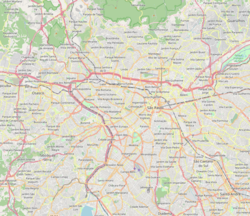Congregação Israelita Paulista
| São Paulo Hebrew Congregation | |
|---|---|
Portuguese: Congregação Israelita Paulista | |
| Religion | |
| Affiliation | Reform Judaism |
| Rite | ties to the Conservative movement |
| Ecclesiastical or organizational status | Synagogue |
| Status | Active |
| Location | |
| Location | São Paulo |
| Country | Brazil |
Location of the synagogue in São Paulo | |
| Geographic coordinates | 23°33′14″S 46°39′36″W / 23.554°S 46.660°W |
| Architecture | |
| Date established | 1936 (as a congregation) |
| Completed | 1936 |
| Website | |
| cip | |
The São Paulo Hebrew Congregation (Portuguese: Congregação Israelita Paulista, abbreviated as CIP) is a Reform Jewish congregation and synagogue, with this to the Conservative movement,[1] located in São Paulo, Brazil. It is the largest congregation in Latin America, serving more than 2,000 families.[2] The congregation was established in 1936 by a group of refugees from Nazi Germany.
Histroy
[edit]The rabbinate of the congregation that follows the liberal movements of Judaism (although not only affiliated to the Reform movement, but also affiliated to the Conservative movement), is currently composed by rabbis Michel Schlesinger, Ruben Sternschein, Rogério Cukierman, and Tamara Schagas.[needs update] There are also the chazanim (cantors) Avi Bursztein, Alexandre Edelstein, and Alexandre Schinazi.
The CIP is known for being the largest Jewish congregation in Latin America, estimated at ninety eight thousand Jews.[when?] They promote a diverse number of activities: religious services, Jewish study groups, informal Jewish school, choir, activities for senior citizens, fields of study, Zionist youth groups (Chazit Hanoar), Boy Scouts and Girl Guides (in Avanhandava), distinguishing itself positively in São Paulo's Jewish community.[3]
Activism
[edit]The congregation has historically engaged in several types of political activism. Maria Luiza Tucci Carneiro of the University of Sao Paolo, wrote that the congregation "is seen as a space of resistance and memory because it initially welcomed German Jews, persecuted by Nazism, and later Italian Jews, persecuted by fascism. Then a resistance nucleus emerged that left a very important legacy in Brazilian culture".[4] Following the death of Jewish journalist Vladimir Herzog during the Military dictatorship in Brazil in the 1970s, the congregation's chief rabbi Henry Sobel stood with interfaith leaders to denounce Herzog's murder by security forces.[5]
Leadership
[edit]- Rabbi Michel Schlesinger
- Rabbi Ruben Sternschein
- Rabbi Rogério Cukierman
- Rabbi Tamara Schagas
See also
[edit]References
[edit]- ^ "Congregação Israelita Paulista (São Paulo, Brazil)". The National Library of Israel. 2024. Retrieved October 11, 2024.
- ^ "Latin America's largest synagogue welcomes first female rabbi". J. The Jewish News of Northern California. Jewish Telegraphic Agency. March 14, 2017. Retrieved September 17, 2021.
- ^ Milkewitz, Alberto (December 1, 1991). "The Jewish Community of Sao Paulo, Brazil". Jewish Center for Foreign Affairs. Retrieved October 14, 2024.
- ^ "Livro conta a história da Congregação Israelita Paulista". Jornal da USP (in Brazilian Portuguese). November 23, 2018. Retrieved September 17, 2021.
- ^ Sandy, Matt (November 26, 2019). "Rabbi Henry Sobel, 75, Dies; Defied Brazil's Military Rulers". The New York Times. Retrieved September 17, 2021.
External links
[edit]- Official website (in Portuguese)
- "São Paulo, Brazil". Encyclopaedia Judaica. The Gale Group. 2007. Retrieved October 12, 2024 – via Jewish Virtual Library.
- Guedes-Reed, Caleb A. (November 3, 2021). "New São Paulo museum looks to educate non-Jews on 'what it means' to be a Brazilian Jew". Jewish Telegraph Agency.
- 1936 establishments in Brazil
- 20th-century synagogues in Brazil
- Ashkenazi Jewish culture in Brazil
- Ashkenazi synagogues
- Conservative Judaism in Brazil
- Conservative synagogues in South America
- German-Brazilian culture
- German-Jewish diaspora
- Jewish organizations established in 1936
- Reform synagogues in Brazil
- Religious buildings and structures in São Paulo
- Synagogues completed in 1936
- Brazilian religious building and structure stubs
- Synagogue stubs

